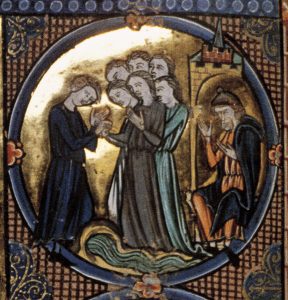Read Elie Wiesel’s essay on Jethro in the Bible as it originally appeared in Bible Review, June 1998.—Ed.

Bodelian Library, Oxford, MS Bodley 2708, Folio 39V
A good man? Moses’ father-in-law, Jethro, is a devoted family man, well respected for his advice on governing and his benevolent leadership of the tribes of Midian. This early 13th-century illustration from the Bible moralisée depicts Jethro (seated under the arch on the right) rewarding Moses (left) for rescuing his daughters (six of whom are pictured in the center) and their flocks from rival shepherds. Grateful, Jethro invited Moses to stay and break bread with him: “Moses consented to stay with the man, and he gave Moses his daughter Zipporah as wife” (Exodus 2:21).
Later, when Moses returns from freeing the Israelites from Egypt, Jethro proclaims the Israelite God’s glory, saying, “Now I know that the Lord is greater than all gods” (Exodus 18:11). But, asks the midrash, was Jethro motivated by love of God or by fear of a divine force so powerful as to rescue the Israelites from their enemies?
On first reading the biblical text, Jethro seems a simple person, almost monolithic, someone who impresses us most as a family man. When he meets a young refugee, Moses, whom he believes to be Egyptian, he thinks immediately of his daughter Zipporah, who is not yet married (Exodus 2:20–21). Later, when Moses, who is now Jethro’s son-in-law, returns from Egypt at the head of his freed people, Jethro brings to him his wife, Zipporah, and their two children (Exodus 18:5).
Moses has in the meantime become powerful and famous, and Jethro gives him useful advice on how to govern (Exodus 18:17ff). Invited by Moses to join the newly created nation, Jethro gracefully declines by invoking his obligations to his own family and tribe in the land of Midian (Numbers 10:29–30).
One can see Jethro clearly: His demeanor is surely elegant, sincere, irreproachable. He is present only when needed. He speaks only when asked. Everything he does, he does without guile. He never thinks of taking advantage of his position as first counselor to the great leader Moses. No one would ever accuse him of nepotism.
In the midrashic literature,a as always, the character, or rather the attitude toward the character, seems more complex. To be sure, Jethro is shown in a positive light. After all, if Moses treats him with such deference, such respect, as to kneel before him, Jethro must deserve it. The sages go so far as to exaggerate his virtues. For most, he is considered to have converted to the Jewish faith. They call him Ger shel emet—a genuine convert or a convert to the truth. He is placed “within the shelter or on the wings of the shekhina,” God’s holy presence or glory. They put these words in Jethro’s mouth: “I have served many idols; there is no god I have not served; but none can compare to the God of Israel.” To emphasize his worth, he is compared to Esau. Even though Esau was a kinsman of Jacob, he was less favored than the alien Jethro.
In the free eBook Ancient Israel in Egypt and the Exodus, top scholars discuss the historical Israelites in Egypt and archaeological evidence for and against the historicity of the Exodus.
Better yet, on at least two occasions in the midrash, Jethro is considered more admirable than Moses himself. In the first, when Jethro offers his daughter Zipporah to Moses, Jethro tells Moses: She will be your wife, but on one condition—your first son will be consecrated to idolatry. The stupefying thing is that Moses accepted! In other words, in this account Jethro appears more loyal to his faith than Moses does to his.
On the second occasion, Jethro, having heard all that the people of Israel have suffered in Egypt, and how God has saved them on their flight from the land ing saved you.” According to the commentary of one sage (Reb Papos), this passage may be intended as a criticism of Moses and the 600,000 men and women who were with him. It is meant as a reproach for their ingratitude: “Despite all the miracles that were performed for you, you have not believed enough to praise the Lord until Jethro did.”
Become a Member of Biblical Archaeology Society Now and Get More Than Half Off the Regular Price of the All-Access Pass!
Explore the world’s most intriguing Biblical scholarship
Dig into more than 9,000 articles in the Biblical Archaeology Society’s vast library plus much more with an All-Access pass.

Having said all this, even though Jethro has no detractors, he does inspire a certain skepticism in some. Is this a way of balancing our understanding of the man? Perhaps. In the Bible, no one is perfect—neither perfectly good nor absolutely evil.
Read an interview BAR Editor Hershel Shanks conducted with Elie Wiesel and Biblical scholar Frank Moore Cross, republished from BAR, July/August 2004 >>
Thus some of the sages ask what are the real motives behind Jethro’s close feelings for Israel. Was it because of the Torah that God gave to His people? Or was it because of the defeat the Israelites inflicted on their enemies, the Amalekites? In other words, was Jethro motivated by love or by fear of this powerful God who makes other nations tremble? “Vayihad Yithro” the Bible says (Exodus 18:9). “Jethro rejoiced” at all the goodness that the Lord had shown to Israel. But vayihad Yithro could easily mean “his flesh crawled [with fear], he had goose bumps.”b
Nonetheless, the general impression of the man is that he is better than good; he is glorious. Even when he refuses Moses’ invitation to stay with him, he has the perfect excuse, says the midrash: “I will return to my own people and convert them all to the study of the Torah.”
The practical and very timely lesson that our sages draw from this story: When a man comes and asks to be converted, we should not send him away.
Translated from French by Anne Renner.
“Supporting Roles: Jethro” by Elie Wiesel was originally published in Bible Review, June 1998, and republished in Bible History Daily on March 19, 2014.
Notes:
a. Midrash is a genre of rabbinic literature that includes nonliteral elaborations of biblical texts.
b. The word vayihad is related to the Aramaic chiddudim, “prickles.” One Jewish Bible commentary explains that Jethro was so overcome with joy that he felt goose bumps. The great medieval Jewish commentator Rashi, however, says that despite Jethro’s happiness for the Israelites, he felt prickles of unease over the fate of the Egyptians.
The author of more than 30 novels, plays and profiles of Biblical figures, Elie Wiesel received the Nobel Peace Prize in 1986. This online publication is adapted from Wiesel’s article “Supporting Roles: Jethro,” which was published in Bible Review in June 1998. At the inception of Wiesel’s Supporting Roles series in Bible Review, BAS editors wrote:
We are pleased—and honored—to present our readers with the first of a series of insightful essays by Elie Wiesel, the world-renowned author and human rights advocate. Wiesel is best known for his numerous books on the Holocaust and for his profiles of Biblical figures and Hasidic masters. In 1986, he was awarded the Nobel Peace Prize. His occasional series for BR will focus on characters in the Bible that do not occupy center stage—those who play supporting roles.
More “Supporting Roles” by Elie Wiesel in Bible History Daily:
Cain and Abel
Joshua
Seth
Aaron
Get more biblical Archaeology: Become a Member
The world of the Bible is knowable. We can learn about the society where the ancient Israelites, and later Jesus and the Apostles, lived through the modern discoveries that provide us clues.
Biblical Archaeology Review is the guide on that fascinating journey. Here is your ticket to join us as we discover more and more about the biblical world and its people.
Each issue of Biblical Archaeology Review features lavishly illustrated and easy-to-understand articles such as:
• Fascinating finds from the Hebrew Bible and New Testament periods
• The latest scholarship by the world's greatest archaeologists and distinguished scholars
• Stunning color photographs, informative maps, and diagrams
• BAR's unique departments
• Reviews of the latest books on biblical archaeology
The BAS Digital Library includes:
• 45+ years of Biblical Archaeology Review
• 20+ years of Bible Review online, providing critical interpretations of biblical texts
• 8 years of Archaeology Odyssey online, exploring the ancient roots of the Western world in a scholarly and entertaining way,
• The New Encyclopedia of Archaeological Excavations in the Holy Land
• Video lectures from world-renowned experts.
• Access to 50+ curated Special Collections,
• Four highly acclaimed books, published in conjunction with the Smithsonian Institution: Aspects of Monotheism, Feminist Approaches to the Bible, The Rise of Ancient Israel and The Search for Jesus.
The All-Access membership pass is the way to get to know the Bible through biblical archaeology.
The post Jethro in the Bible appeared first on Biblical Archaeology Society.



0 Commentaires